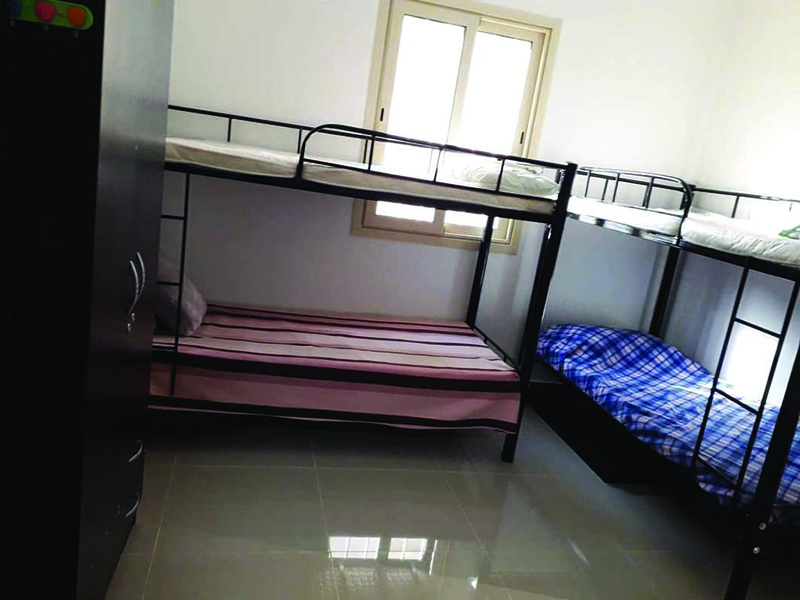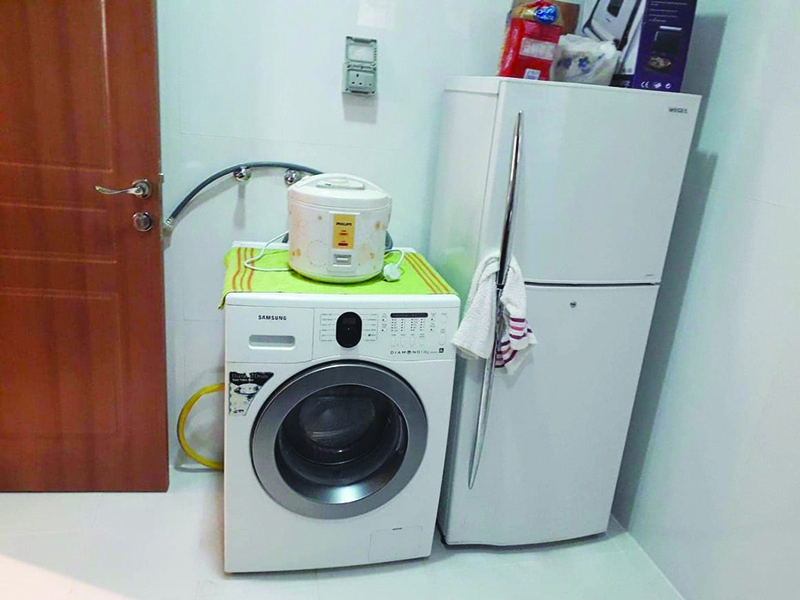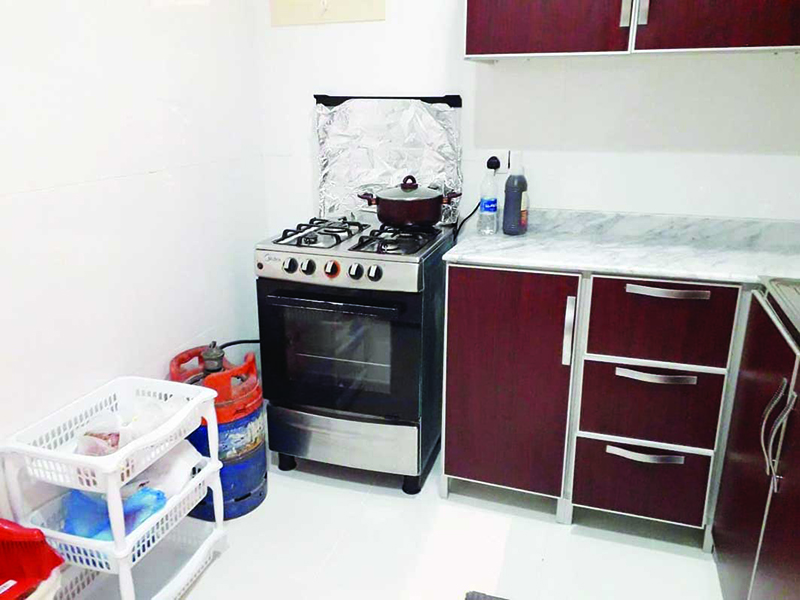 KUWAIT: Pictures from inside accommodations prepared for Filipino domestic helpers.
KUWAIT: Pictures from inside accommodations prepared for Filipino domestic helpers.By Ben Garcia
KUWAIT: Preparations for the imminent resumption of hiring Filipino domestic helpers continues, especially by foreign and local recruitment agencies, to meet the demands of the Philippine Embassy in Kuwait and requirements of the Philippine Department of Labor and Employment. Recruitment agencies are busy refurbishing their offices, as some of them have been out of business for over a year.
“This was the longest ban imposed by the Philippine government, but it was also triggered by the coronavirus outbreak. If not for many uncontrolled events including the pandemic, talks on contracts and other provisions sought by the Philippines would have been resolved. We have been out of business for the last one year and a half. Since late 2019, the Philippine Embassy has suspended the deployment of domestic helpers, while 2020 was out of the question because of the pandemic. Now the first quarter of 2021 is over, and we are hoping we can start recruitment by April,” said Mariam Macapudi, President of the Filipino Association of Secretaries of Employment Agencies in Kuwait (Fil-Aseak), a group comprising of 200 licensed recruitment agencies.
Besides Fil-Aseak, another group of agencies recognized by the embassy is the Filipino Clients Relations Officers (FILCRO), with 90 active agencies. Macapudi said the demand of the Philippine Embassy to have decent accommodations for Filipino domestic helpers is being seriously fulfilled, but they are also requesting some more time to comply, since most of the accommodations rented prior to ban were given up. “Our sector has been out of business for the past 1.5 years. Having said that, we are also aware we cannot deploy our workers right away because of too many travel restrictions imposed by our government and also the Kuwaiti government. Newly-hired domestic helpers must also be quarantined, so I don’t see the immediate need for accommodations,” she said.
The new accommodations must be complete with all necessary amenities, including living rooms, TV, Internet, bathrooms, kitchen utensils and refrigerators and cooking ranges. “The requirements are fair and necessary. In fact, even before this condition was imposed, we already had accommodations for workers. But some agencies relinquished the accommodations during the pandemic because we did not know when we were going to be allowed to hire domestic helpers,” Macapudi added.
Macapudi said her group is ready to comply with all the necessary requirements imposed by the Philippine government, including the requirement of accommodations and all the provisions mentioned in the tripartite contract.
Last week, Philippine Embassy’s Labor Attache to Kuwait Nasser Mustafa said he is expecting the start of redeployment of Filipino domestic helpers by April. “Everything has been ironed out except for a few technical issues, like the inspection of accommodations of domestic helpers to be provided by the foreign recruitment offices in Kuwait, and some more briefings with the secretaries of recruitment agencies to explain to them the tripartite contract which we will be using from now onwards,” said Mustafa, who is also the Philippine Labor Attache to Saudi Arabia.
On March 23, the Philippine Labor Office in Kuwait held an online webinar with Philippine-based owners and the secretaries of agencies in Kuwait to explain to them the provisions of new tripartite contract.
“We were briefed and told to strictly comply with all the provisions in the tri-party contract or they will not hesitate to re-impose the ban again. That is why we are all carefully listening to the speakers, because it’s a matter of bread and butter for all of us. We do not want a ban at all. Many of my colleagues in the agency were out of jobs for many months. Some of them transferred to another jobs because we do not know when we are going to restart the business,” said a secretary who did not want to be identified.
“One strict rule which they also want to impose is the reporting and monitoring of our deployed workers. They told us every month, they want to hear about the workers deployed. They said we need to call or at least have continuously open lines of communications with them, so that we are able to rescue the workers, with the authorities here, if necessary as soon as possible. So before handing the housemaids over to the sponsors, the sponsors must be briefed on our requirements and about the tri-party contract. If they do not agree, we are not going to provide them workers,” she said.
Provisions in the new tri-party contract include providing the housemaid with decent and appropriate housing equipped with all the necessities, providing suitable food and clothing, providing medical treatment in case of sickness pursuant to the healthcare insurance system of Kuwait, salary must be paid at the end of the month - not less than the designated amount signed by both parties, compensating the housemaid in case of injury while during work, employers must issue a valid residency for the duration of contract, handle all the expenses to bring the housemaid, and in case of death, the employer must also bear the expenses of the deceased body.
The new tripartite contract also mentions that the employer is not allowed to assign the worker outside Kuwait without an agreement from the worker. The housemaid is also allowed to use the phone outside working hours, provided that she maintains the privacy of the household and in a manner consistent with public morals. Working hours must be 12 hours daily and employers must allow the housemaid to rest for eight continuous hours.
 They must have a fully-paid weekly day off, annual leave, end-of-service benefit or one full month for every year of service, plus a bonus equivalent to one month’s salary annually. The employer is not allowed to keep the passport in their possession. The employer needs to provide an economy ticket to the worker at the end of her contract, and in case of conflict the case will be referred to the Public Authority of Manpower.
They must have a fully-paid weekly day off, annual leave, end-of-service benefit or one full month for every year of service, plus a bonus equivalent to one month’s salary annually. The employer is not allowed to keep the passport in their possession. The employer needs to provide an economy ticket to the worker at the end of her contract, and in case of conflict the case will be referred to the Public Authority of Manpower.
On Jan 3, 2020, the Philippines implemented a ban on sending domestic workers to Kuwait following the killing of a housemaid named Jeanelyn Padernal Villavende on Dec 28, 2019. The ban was lifted a month later after consultations with the Philippine Department of Foreign Affairs (DFA), the filing of appropriate charges against the perpetrators and after Manila and Kuwait City agreed the full implementation of a harmonized employment contract for Filipino domestic workers. On Dec 30, 2020, a death verdict by hanging was handed by the criminal court to a Kuwaiti woman who killed Villavende. The woman’s husband was sentenced to four years in jail for covering up and not reporting the crime.
As of June 2020, there were nearly 680,000 domestic workers in Kuwait - 325,000 from India and nearly 150,000 from the Philippines. Local and their international partner agencies are allowed to charge employers up to KD 990 for hiring new domestic helpers.












